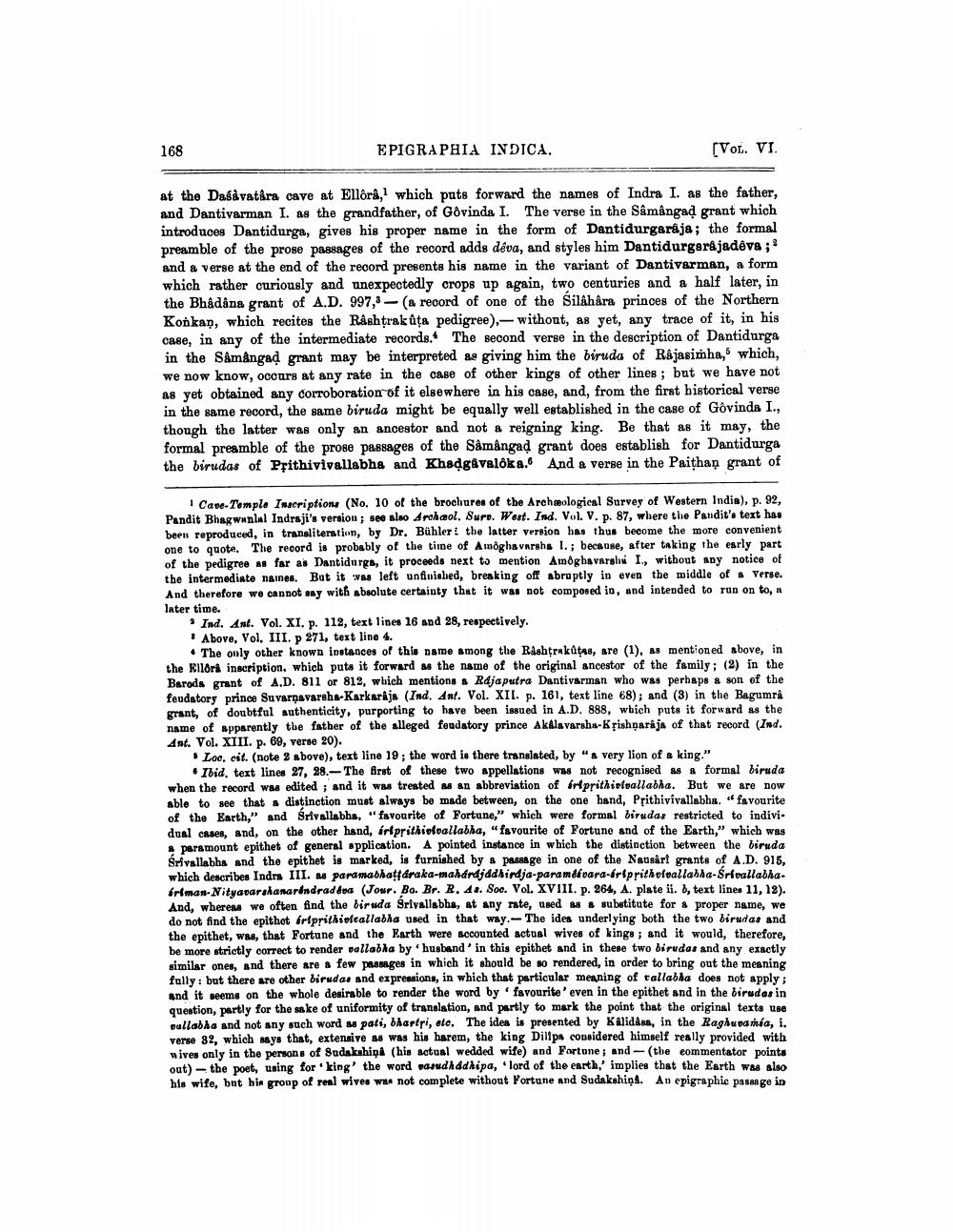________________
168
EPIGRAPHIA INDICA.
(VOL. VI.
at the Dasavatára cave at Ellora, which puts forward the names of Indra I. as the father, and Dantivarman I. as the grandfather, of Govinda I. The verse in the Sâmångad grant which introduces Dantidurga, gives his proper name in the form of Dantidurgaraja; the formal preamble of the prose passages of the record adds déva, and styles him Dantidurgarajadêva ; and a verse at the end of the record presents his name in the variant of Dantivarman, a form which rather curiously and unexpectedly crops up again, two centuries and a half later, in the Bhâdâna grant of A.D. 997,3 - (a record of one of the Silâhâra princes of the Northern Konkan, which recites the Rashtrakûţa pedigree), - without, as yet, any trace of it, in his case, in any of the intermediate records. The second verse in the description of Dantidurga in the SÅmångad grant may be interpreted as giving him the biruda of Rajasimha, which, we now know, occurs at any rate in the case of other kings of other lines ; but we have not as yet obtained any corroboration of it elsewhere in his case, and, from the first historical verse in the same record, the same biruda might be equally well established in the case of Govinda I., though the latter was only an ancestor and not a reigning king. Be that as it may, the formal preamble of the prose passages of the Sâmångad grant does establish for Dantidurga the birudas of Prithivivallabha and Khadgivalók a. And a verse in the Paithan grant of
Care-Temple Inscriptions (No. 10 of the brochures of the Archeological Survey of Western India), p. 92, Pandit Bhagwanlal Indraji's version ; see also Arohaol. Suro. West. Ind. Vol. V. p. 87, where the Pandit's text has been reproduced, in transliteration, by Dr. Bühler! the latter version has thus become the more convenient one to quote. The record is probably of the time of Amoghavarshs I.; because, after taking the early part of the pedigree as far as Dantidurgs, it proceeds next to mention Amoghavarsh I., without any notice of the intermediate naines. But it was left unfinished, breaking off abruptly in even the middle of a verse. And therefore we cannot say with absolute certainty that it was not composed in, and intended to run on to, later time.
. Ind. Ant. Vol. XI. p. 112, text lines 16 and 28, respectively. * Above, Vol. III. p 271, text line 4.
• The only other known instances of this name among the Rashtrakūtas, are (1), as mentioned above, in the Ellors inscription, which puts it forward m the name of the original ancestor of the family: (2) in the Berods grant of A.D. 811 or 812, which mentions s Rdjaputra Dantivarman who was perhaps & son of the feudators prince Suvarnavarshe-Karkarijs (Ind. Ant. Vol. XII. p. 161, text line 68); and (3) in the Bagumrå grant, of doubtful authenticity, purporting to have been issued in A.D. 888, which puts it forward as the name of apparently the father of the alleged feudatory prince Akala varsha-Krishộaraja of that record (Ind. Ant. Vol. XIII. p. 69, verse 20).
Loc. cit. (note 3 above), text line 19; the word is there translated, by " very lion of a king."
• Ibid, text lines 27, 28.-The first of these two appellations was not recognised as a formal biruda when the record was edited ; and it was treated as an abbreviation of Sriprithivioallabha. But we are now able to see that a distinction must always be made between, on the one hand, Prithivivallabha. "favourite of the Earth," and Srlvallabha, "favourite of Fortune," which were formal birudas restricted to individual cases, and, on the other hand, irlprithiofvallabha, "favourite of Fortune and of the Earth," which was
Paramount epithet of general application. A pointed instance in which the distinction between the biruda Srvallabha and the epithet is marked, is furnished by a passage in one of the Nausart grants of A.D. 915, which describes Indrs IIL M paramabhatfdraka-mahardjddlindja-param divara-briprithvfeallabha-Srlvallabha. értman-Nityanarslanarindraddoa (Jour. Bo. Br. R. 43. Soe. Vol. XVIII. p. 264, A. plate ii. b, text lines 11, 19). And, where we often find the biruda Sriyallabha, at any rate, used as a substitute for proper name, we do not find the epithet frlprithiofeallabha used in that way. The ides underlying both the two birudas and the epithet, was, that Fortune and the Earth were sccounted actual wives of kings and it would, therefore, be more strictly correct to render vallabha by husband' in this epithet and in these two birdas and any exactly similar ones, and there are a few passages in which it should be so rendered, in order to bring out the meaning fully, but there are other birudar and expressions, in which that particular meaning of tallabla does not apply and it seems on the whole desirable to render the word by 'favourite even in the epithet and in the birudas in question, partly for the sake of uniformity of translation, and partly to mark the point that the original texts use pallabha and not any such word sa pati, bhartri, etc. The idea is presented by Kalidasa, in the Raghuvamia, i. verse 82, which mays that, extensive ss was his harem, the king Dilips considered himself really provided with wives only in the persons of Sudakshina (his actual wedded wife) and Fortune ; and the commentator points out)-the poet, using for king' the word warudhadkipa, lord of the earth,' implies that the Earth was also his wife, but his group of real wives was not complete without Yortune and Sudakshiql. An epigraphie pasage in




